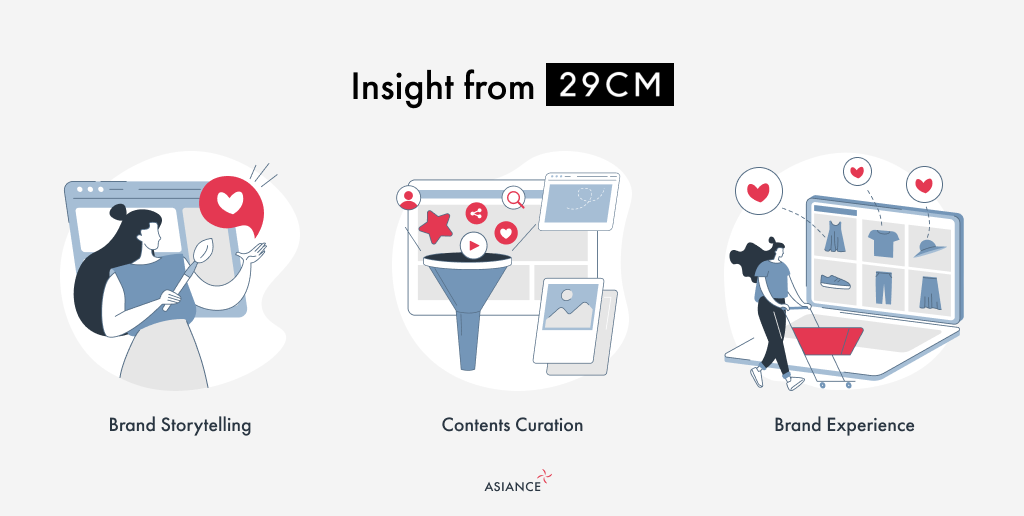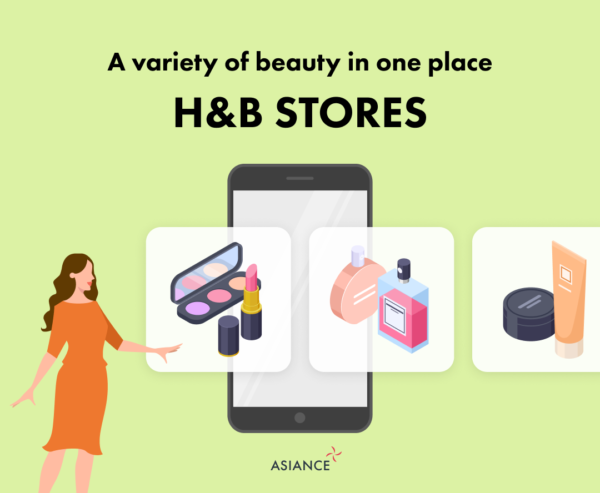Korea’s Leading Multi Shop Selling Vibes – 29CM
In the last posting, we covered Musinsa, an e-retailer that targets the male MZ fashion category. Today, we will look at 29CM. Among the vertical platforms1 aimed at the MZ generation like Musinsa, 29CM is an online multi-shop that focuses on delivering content through brand storytelling. like Musinsa.
29CM was established in 2011 and sales in 2019 reached about 1511 billion KRW. They started with 45 billion KRW in 2018 and exceeded 180 billion KRW in 2020. This year, they aim to more than double their growth, and their trading volume has already grown by 100% for three consecutive years from 2018 to 2020. By 2017, 29CM had put their focus on content and media rather than being commerce-centered, while 2018 saw its trading volume, sales and profit margins grow together, surpassing the break-even point for the first time in 2020. In 2018, 29CM was taken over by StyleShare, a fashion vertical platform tailored to teenage women.
Recently, whereas 29CM still maintains fashion-related contents and brands as the main category, they expanded to selling also various products in lifestyle and beauty. 29CM has a variety of unique success strategies to secure the MZ generation and opinion leaders. The main customer base can be classified into 2535 generations, also known as millennials, with a gender distribution of 65% female and 35% male. They are interested in trends, but they have a firm taste and have a strong interest in brand story and philosophy.
At the time of 29CM’s launch, a number of designer and artist brands were appearing and mobile shopping was booming. And CEO Chang-woo Lee, who founded 29CM, wanted to combine them to create a new shopping mall. The ‘C’ in 29CM stands for Commerce and ‘M’ stands for Media, representing 29CM’s media commerce strategy in name. Furthermore, with its identity as ‘Guide to Better Choice’, 29CM is an effective window for brand identity. In 29CM, unlike other platforms, brand search exceeds product search, which further supports the fact that 29CM is specialized in branding.
<29CM’s marketing strategy>29CM’s brand storytelling delivering method – PT
• Short form type shoppable video – 29TV
• Increasing new brand’s brand awareness – New Launching on Wednesday (수요입점회)
• Curating 100 items led by 100 people – The Daily Guide (매일의 가이드)
• Curation shop in convenience store concept – 29CM Store
The media commerce strategy that 29CM focuses on is to post content that represents product awareness on social channels and online, increase awareness, and increase the effect of conversion. 29CM stands for this content-driven media commerce, and next we’ll look at the services that stand for this strategy.
First of all, the ‘PT’ segment was first introduced in 2013 with the purpose of delivering the value of the brand in an online presentation format. 29CM is introducing brands and products using their own tone and manner. It explains their brand history or philosophy, and aims to improve brand understanding through storytelling. 29CM also provides promotions and events to deliver benefits. This strategy is preferred by companies that wish to launch branding campaigns with empathy targeting mainly millennial customers. As of December 2019, 29CM has worked with more than 250 companies, such as with Tesla, Netflix, and Freitag, and more.
The ‘29TV’ segment was launched in 2020 as a service within the 29CM website that provides 29 seconds of shoppable video. If a customer would like to buy a product while watching 29 seconds of videos about brands and products, purchase is possible right away by pressing the button on the bottom. It is a similar concept to Instagram’s Instagram story, and is characterized by the fact that brands can create and upload contents by themselves. This way, brands can introduce their products and brands at any time and in any form they want. 29CM brands can upload videos of products and stories they would like to promote to their accounts at any time. This approach is tailored to the MZ generation’s preferred format of short-form video, making it an effective marketing tool.
‘New Launching on Wednesday’ is another feature on 29CM and is a concept that introduces new brands every Wednesday at 10 am with a 29% discount for a day. 29CM helped brands grow by introducing a total of 1360 brands in 2020. This strategy is in line with their ‘Guide to Better Choice’ slogan as it indicates that a brand can be branded with 29CM if they deem it worthy to recommend to Korean consumers regardless of the recognition or size. In fact, sales of the new lifewear brand ‘Clove’ increased more than 8 times and 30% of the total stores have doubled their sales compared to the previous year.
‘The Daily Guide’ is a curation program that interviews 100 people with different tastes and lifestyles and introduces their recommended items. This program started in August 2020 and ran for 100 days until January 1, 2021. During the 100-day project, various celebrities and influencers appeared as curators and uploaded contents to the 29CM platform and Instagram. In addition, 29CM held an Instagram participation event where 29CM customers had the opportunity to become curators. When a customer uploaded reviews of items purchased at 29CM, mileage points to 1,000 first-come-first-served customers was offered to make them actively participate in the event. Various brands had the opportunities to improve their awareness and got direct reviews and feedback from customers.
The ‘29CM store’ was conducted in cooperation with KEB Hana Bank in 2018 as 29CM’s first offline project. It is a Culture Bank project that curates and provides contents derived from local culture with the idea of sharing KEB Hana Bank’s Gangnam branch space with residents. The goal of the Culture Bank Project is to create a win-win society for ‘Neighborhood and Bank’. 29CM is Hana Bank’s fourth Culture Bank partner and responsible for the overall planning, design and operation of the 29CM store. The concept of the 29CM store took the online curation experience offline and starts with friendly consumption in daily life. With the concept of ‘convenience store’, 29CM sells household goods, food, and fashion brands even from their online platform. After 4pm when the bank closes, the space is used for pop-up stores, 29CM PT planning exhibitions, and showcase events of various brands as an opportunity to promote 29CM brands and products. Through this, 29CM introduces new brands to consumers and offers a variety of curations and experience content to help them make better choices.

<Insight from 29CM’s strategy>
• Importance of storytelling – Content with empathy delivering brand sensitivity
• Value of curation – Content and product curation that appeal to the target group
• Re-definition of offline stores – Strengthening the direct brand experience
Even when purchasing one item of clothing, consumers no longer merely focus on cheap prices. As we saw in 29CM’s example, we can see that effective storytelling of brands can be successfully imprinted on consumers. Then what are the insights that brands can refer to from this?
First of all, consumers value keywords that they can relate to rather than stories that are hard or difficult to read. Especially the MZ generation tends not to consume the contents of any product or brand if they are too long or not familiar. This is because the purchase experience is also positive only when customers who view the content can easily apply to their daily lives. Even though 29CM’s content is new to introducing unfamiliar brands, it is receiving positive feedback from customers by simply expressing brand identity for everyone to understand.
As you can see from 29CM’s daily guide service, the role of curation is also important. The curation of content that appeals to the brand’s target audience can be imprinted on the consumers in relation to brand origin, seasonal issue, anniversary, etc. The MZ generation particularly tends to appeal to specific tastes tailored to individuals rather than of the general and inclusive tastes. For example, there is a higher number of online mentions of ‘earl grey’ than ‘black tea’, as well as ‘matcha’ than ‘green tea,’ which shows that language and content that tastes proportional to individual knowledge and interest are more important than a single universal category. Therefore, brands should consider more sophisticated and specific curation that focuses on the taste of the specific target audience.
Since the COVID-19 pandemic, online consumption has accelerated and ironically, the role of offline stores has become even more crucial. Offline spaces now focus on creating an offline ‘environment’ by adding ‘engagement’ and ‘entertainment’ elements that are difficult for customers to obtain online so that consumers can actually experience physical space. For example, exclusive events, promotions, or experience zones only in offline stores have proven successful. Customers who visit the brand store value the unique mood, feeling, and experience that can only be felt in offline spaces. The fact that the store visit itself can be used as a content is that not only online but also offline customer participation helps encourage the MZ generation to understand the brand. By having a space-only story like the 29CM store or Musinsa store and combining events or exhibitions to communicate with consumers, brands can successfully communicate and cater to target customers.
Are you interested in Asiance’s insights?
1 The vertical platform is a format that provides one service (shopping, music, photography, education, etc.) or one function (search, social, commerce, etc.) to those interested in information and services in a particular field. On the contrary, an integrated mall combines all categories of products. Those include open markets such as Coupang and Gmarket, home shopping malls, duty-free shops, and online malls run by large companies. Vertical platforms are ranked in the order of Musinsa, W Concept, Style Share, and 29CM based on sales in 2019. There are various categories of vertical platforms in Korea, but the most popular platforms in recent years are fashion and food related.













